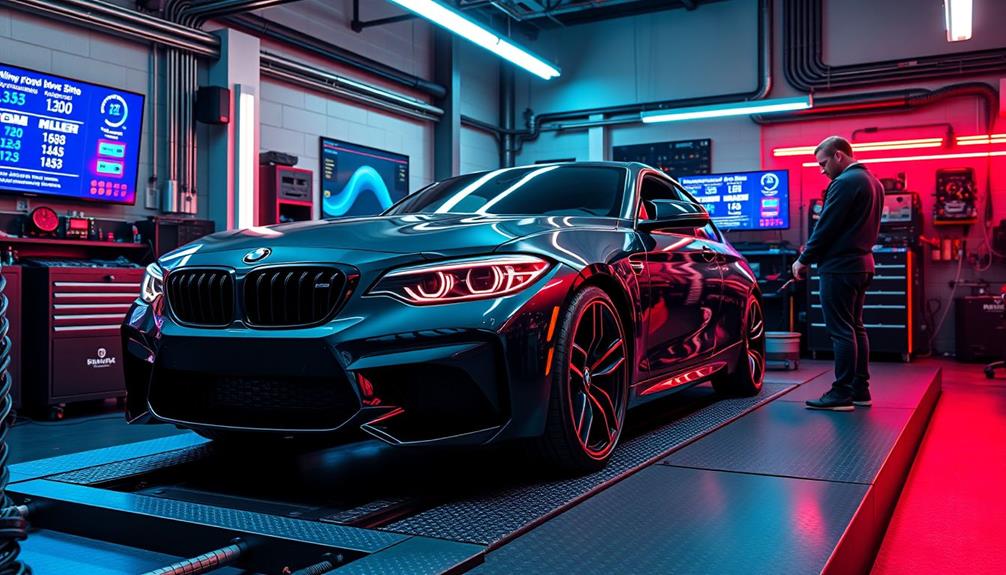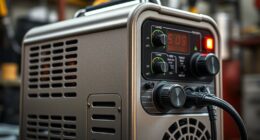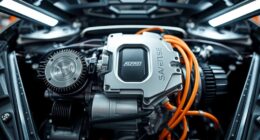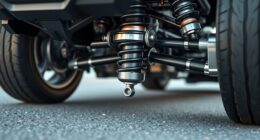To boost your BMW Z3's power, start with a cold air intake and a performance exhaust system. These mods can collectively add 50-70 HP. Consider forced induction, like a supercharger, for a significant power jump—sometimes up to 100 HP. Don't overlook suspension upgrades for better handling and braking performance; adjustable coilovers and lightweight components make a big difference. Finally, community insights can guide you on practical tweaks and costs. There's more to explore about tuning options and essential modifications tailored for your Z3's peak performance.
Key Takeaways
- A cold air intake can increase horsepower by 25-30 HP, improving engine airflow and performance.
- Pairing a sports exhaust system with ECU remapping can yield an additional 25-30 HP boost.
- Supercharger kits can elevate Z3 output from 186 HP to around 270 HP for significant power gains.
- Upgrading suspension with adjustable coilovers and larger anti-roll bars enhances handling and cornering stability.
- Weight reduction through lightweight components or removing unnecessary parts improves acceleration and overall vehicle agility.
Overview of Z3 Tuning Options
When it comes to tuning your BMW Z3, you can easily immerse yourself in a variety of options that enhance both performance and driving experience. One of the most popular upgrades is the cold air intake, which improves airflow to the engine, resulting in a noticeable power boost.
When you combine this with a sports exhaust system and effective ECU remapping, you could see an impressive increase of about 25-30 horsepower.
For those with a 2.8L engine, consider supercharging for substantial gains. The Paxton supercharger kit is highly regarded for its ability to deliver power without compromising engine longevity, meaning you won't have to worry about extensive lower-end upgrades.
If you're looking for a balanced approach, Stage 1 modifications like lighter flywheels, alloy wheels, and suspension enhancements can dramatically improve handling while adding power.
For serious enthusiasts, Stage 2 and Stage 3 options offer high flow fuel injectors and internal engine upgrades that can take your performance to the next level. Engaging with the Z3 community through forums can also provide insights and shared experiences to help guide your tuning journey.
Essential Engine Modifications

When you're looking to enhance your BMW Z3's performance, consider the benefits of a turbocharger installation.
Not only can it considerably boost horsepower, but pairing it with a performance exhaust system will maximize airflow and efficiency.
Together, these modifications can transform your driving experience and release the true potential of your engine.
Turbocharger Installation Benefits
Installing a turbocharger on your BMW Z3 can transform your driving experience by delivering a substantial boost in horsepower. With potential gains ranging from 50 to over 100 HP, depending on your setup and tuning, you'll feel a noticeable difference in acceleration and overall performance.
Not only does this modification enhance your vehicle's capabilities, but it also aligns with the principle of investment in your car's performance and value. Unlike naturally aspirated modifications, a turbocharger provides a more efficient power boost, enhancing low-end torque and responsiveness.
However, keep in mind that the cost of a turbo setup typically exceeds $6,000, which includes installation, tuning, and necessary supporting modifications to guarantee your engine's reliability.
Proper tuning after installation is vital to optimize air-fuel ratios and prevent engine damage—poorly tuned turbo systems can lead to significant performance issues.
To fully realize the performance potential of your turbocharger, you may also need additional upgrades, like intercoolers and upgraded fuel injectors.
These components help maintain engine health and make sure that your roadster delivers the thrilling performance you're aiming for. Embracing a turbocharger can elevate your BMW Z3 into a powerful machine, but it's important to approach the installation with careful planning and execution.
Performance Exhaust Systems
Upgrading your BMW Z3 with a performance exhaust system can considerably enhance your car's power and sound. A well-designed system can give you up to 40 additional horsepower, especially when paired with other modifications like cold air intakes.
However, it's vital to take into account the design; oversized pipes can actually hurt your power and torque. Proper sizing is essential for peak performance.
Most high-performance exhaust systems are made from stainless steel, which offers durability and corrosion resistance, ensuring that your setup lasts while maintaining peak performance.
One of the most enjoyable aspects of installing a performance exhaust system is the enhanced exhaust note. You'll experience a sportier sound that many enthusiasts crave, making every drive more thrilling.
These systems also improve exhaust gas flow, which can lead to better throttle response and overall engine performance, particularly in OBD1 engines.
Effective Intake and Exhaust Upgrades

To maximize your BMW Z3's performance, effective intake and exhaust upgrades are vital.
Start with a cold air intake; it can greatly improve airflow and potentially yield a power increase of 25-30 HP when paired with other modifications. For best results, consider upgrading to a high-performance panel air filter made of cotton. This type of filter enhances overall engine performance by providing better airflow than standard options.
Next, focus on your exhaust system. Upgrading to a free-flow exhaust system can boost horsepower considerably, but make sure the design allows for balanced gas flow to avoid power loss from oversized pipes.
The synergy between upgraded intake and exhaust systems is significant; together, they enhance engine efficiency and output.
If you're looking for even greater power, a supercharger kit like the Paxton system designed for the 2.8L engine offers a substantial boost while maintaining engine longevity.
This option doesn't require extensive internal upgrades, making it a smart choice for enhancing your Z3's performance.
Enhancing Handling and Suspension
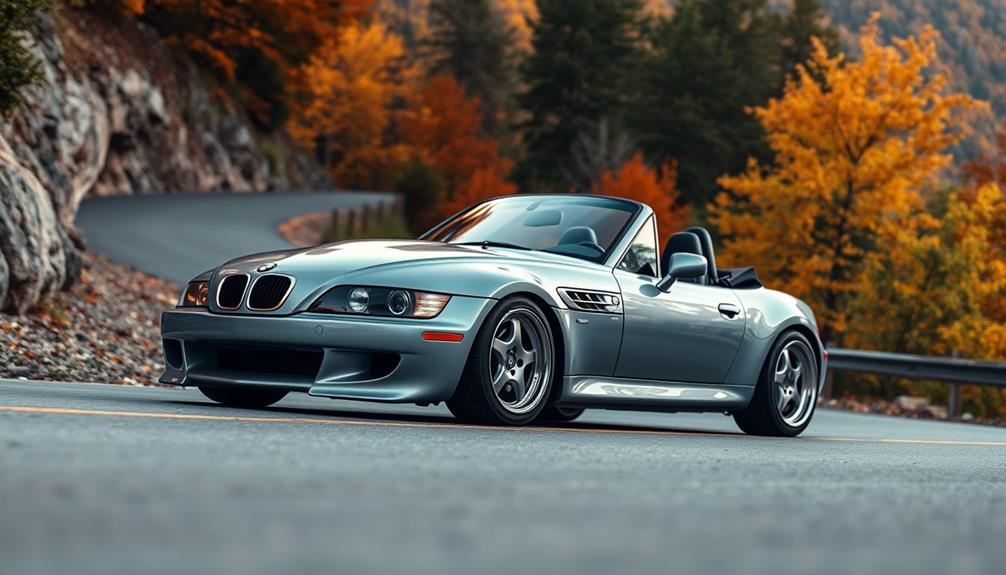
When it comes to enhancing your BMW Z3's handling and suspension, upgrading your brakes is a game changer for spirited driving.
Larger brake discs and high-friction pads provide the stopping power you need for confidence on the road.
Additionally, consider adjustable coilovers to fine-tune your ride height and damping settings, aligning your setup with your driving style.
Suspension Upgrade Recommendations
A well-tuned suspension can transform your BMW Z3 into a handling powerhouse, elevating your driving experience. To achieve this, consider upgrading to adjustable coilover suspension systems. These allow for precise ride height adjustments and damping settings tailored to your preferences, resulting in significant handling improvements.
Next, installing polyurethane bushings enhances the durability and responsiveness of your suspension components, which directly improves handling characteristics, though you might notice a firmer ride.
For better cornering stability, larger diameter anti-roll bars are a must. They minimize body roll, making them popular among Z3 owners focused on performance.
You should also think about upgrading to performance dampers and springs. This combo enhances ride quality and responsiveness, giving you better control during spirited drives or track days.
Brake Performance Enhancements
Upgrading your BMW Z3's braking system is vital for enhancing both handling and suspension performance. By focusing on brake performance enhancements, you'll notice a significant difference in your driving experience.
Here are some key upgrades to take into account:
- Larger Brake Discs: These allow for better heat dissipation, reducing fade during spirited driving.
- High-Friction Brake Pads: Improved stopping power and responsiveness are essential, especially during aggressive driving or track use.
- Stainless Steel Braided Brake Lines: Replacing stock rubber lines reduces flex under pressure, giving you a firmer pedal feel.
Additionally, look into a brake upgrade kit that includes larger calipers and rotors. This can dramatically improve handling and overall vehicle stability.
Don't forget the importance of regular maintenance and inspection of your braking system. Worn components can compromise performance and safety, so timely replacements are vital.
Power Gains From Forced Induction
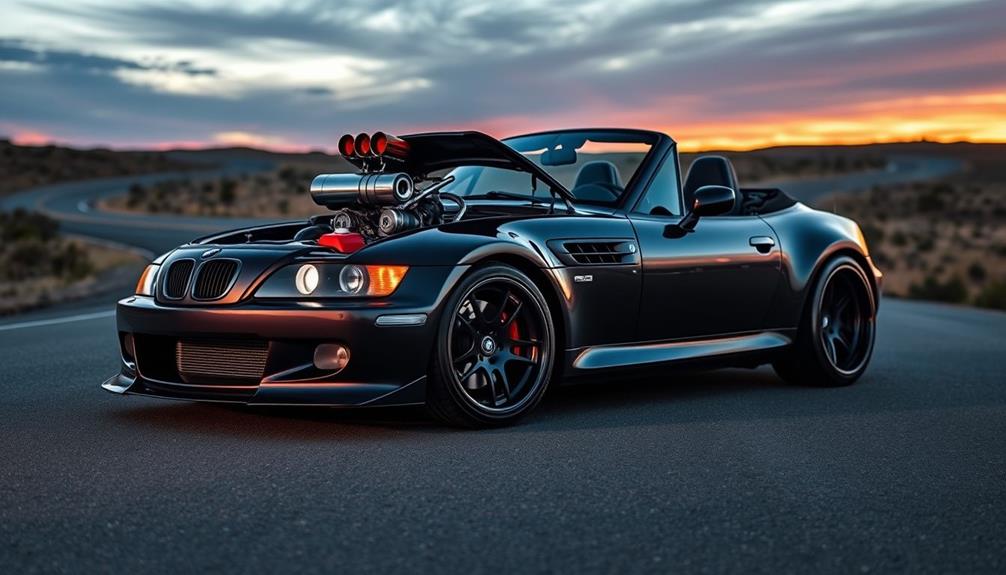
Harnessing the power of forced induction can transform your BMW Z3 from a spirited roadster into a performance powerhouse. By adding either a supercharger or turbocharger, you can expect impressive gains in horsepower. Supercharger kits can elevate your Z3's output from 186 HP to around 270 HP, typically costing around $4,500. Turbo setups, while pricier at over $6,000, offer substantial power increases that can leave naturally aspirated setups in the dust.
When you opt for forced induction, keep in mind that you'll need to make some additional modifications to your engine. Here's a quick overview of the power gains and costs associated with these systems:
| Modification Type | Estimated Cost | Power Gain | Reliability Benefits |
|---|---|---|---|
| Supercharger | $4,500 | 186 HP to 270 HP | High with proper tuning |
| Turbocharger | $6,000+ | Significant gains | Requires careful tuning |
| Fuel Injectors | Additional cost | Vital for power | Guarantees ideal flow |
| High-Performance Fuel Pump | Additional cost | Necessary for boost | Enhances reliability |
Don't forget that tuning your engine management system is essential for peak performance and reliability.
Importance of Weight Reduction
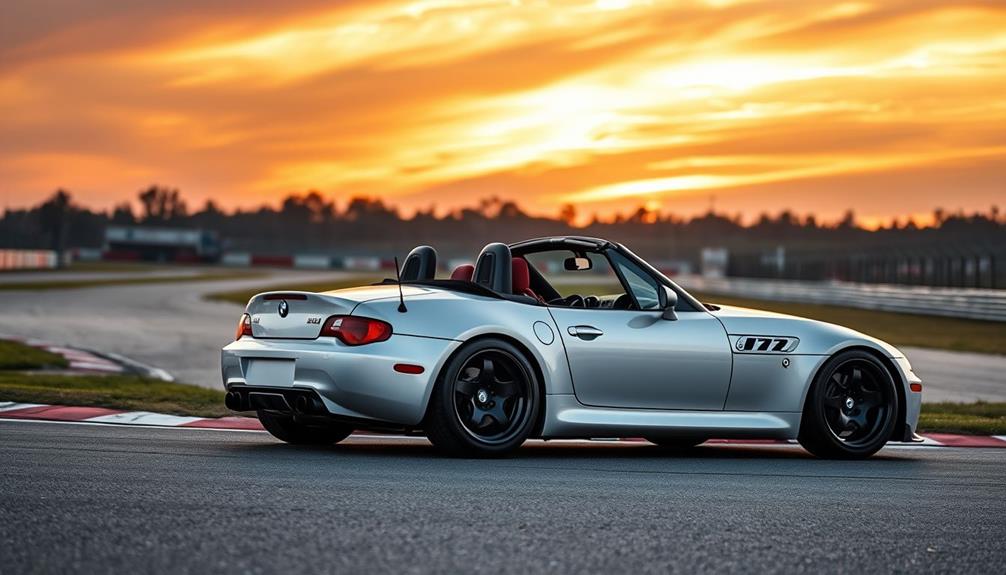
Weight reduction plays a pivotal role in enhancing the performance of your BMW Z3, as a lighter vehicle translates to better acceleration, improved handling, and more responsive braking.
By focusing on weight reduction, you can greatly elevate your driving experience and reveal the full potential of your roadster.
To achieve effective weight reduction, consider these strategies:
- Replace stock components: Swap out heavier parts for lightweight alternatives like carbon fiber hoods or aluminum wheels, which can drop your overall weight by 10-20%.
- Remove unnecessary items: Ditch rear seats or spare tires to enhance agility, leading to quicker lap times and better everyday responsiveness.
- Install lightweight racing seats: These can save you 20-30 pounds per seat, lowering your center of gravity and improving cornering stability.
Achieving a weight reduction of 100-200 pounds can yield impressive benefits, including an enhanced horsepower-to-weight ratio and improved fuel efficiency.
In your journey to boost your BMW Z3's performance, weight reduction is an essential consideration that shouldn't be overlooked.
Community Insights and Experiences

The BMW Z3 community is a vibrant hub where enthusiasts share insights and experiences that can guide your tuning journey. As a Z3 owner, you'll find valuable information about ideal modifications to enhance your roadster's power. Many members report that combining a cold air intake with a free flow exhaust can yield a power increase of 25-30 horsepower for the 3.0L engine, a mod worth considering.
Z3 owners often emphasize the effectiveness of supercharger kits, especially the Paxton kit for the 2.8L engine. Users appreciate the substantial power gains it provides without compromising engine longevity.
However, keep in mind that while modifications can boost performance, real-world power gains may not always meet manufacturer claims, so it's crucial to maintain realistic expectations.
The community is also a great resource for aftermarket parts, with popular interior upgrades like custom shift knobs and alloy pedals enhancing both personalization and driving feel.
Active discussions on forums keep Z3 owners informed about market trends for modifications, helping you make informed decisions as you navigate your tuning journey. Engaging with fellow enthusiasts will certainly enrich your Z3 experience.
Legal Considerations for Modifications
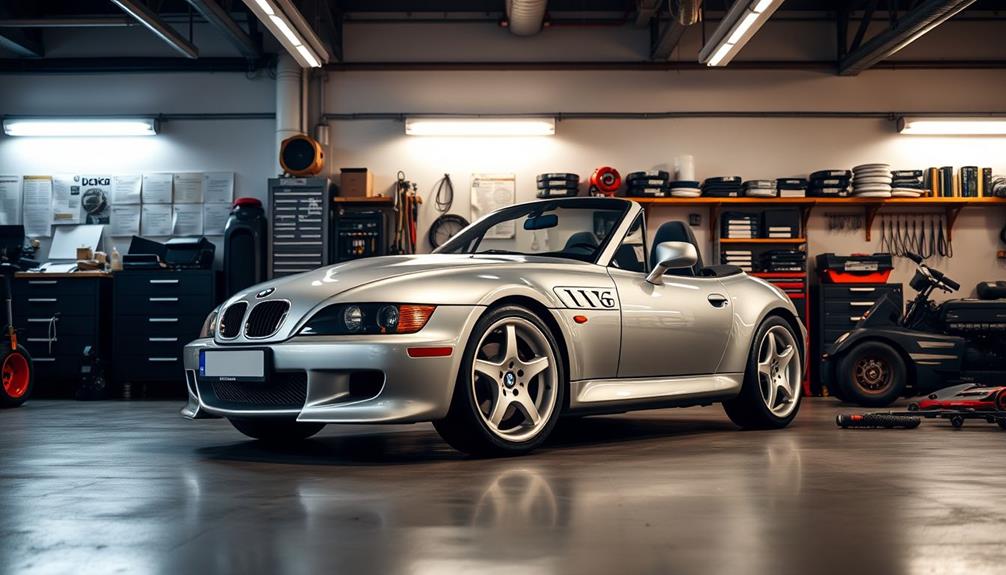
When considering modifications for your BMW Z3, it's important to be aware of the legal implications that come with those changes. Ignoring local laws can lead to hefty fines and complications down the line.
Different states have varying regulations, so researching your local laws is vital to guarantee compliance.
Consider these key points when modifying your Z3:
- Removing catalytic converters or emissions components can violate federal laws.
- Modifications for street use should prioritize legality to avoid issues during traffic stops.
- Track modifications generally face fewer restrictions, but still require awareness of local regulations.
Budgeting for Performance Upgrades
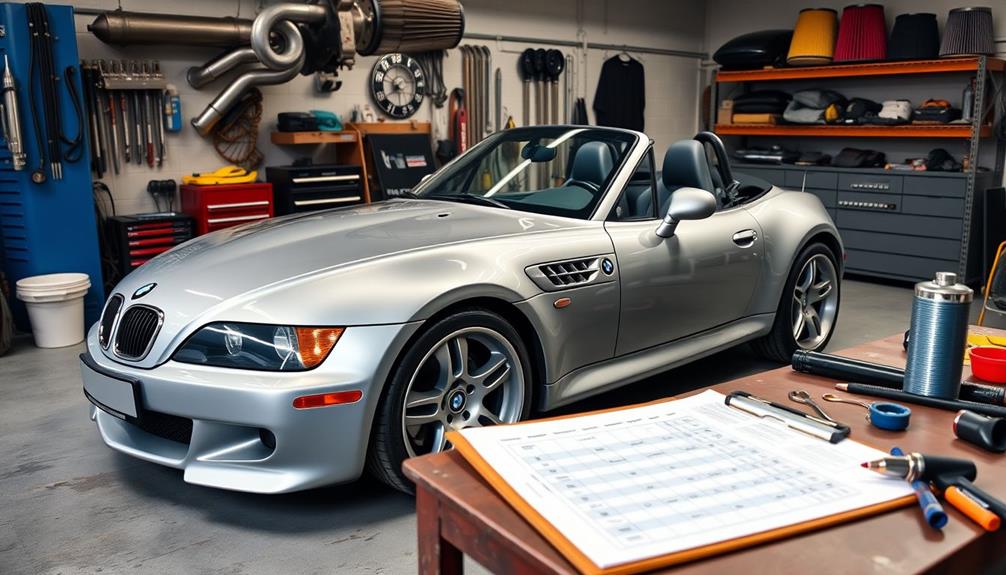
Understanding the legal considerations for modifications lays the groundwork for your next steps—budgeting for performance upgrades. When you're looking to boost your BMW Z3's power, it's essential to know what you can afford. Performance upgrades can vary widely in cost, so let's break it down.
| Modifications | Estimated Cost |
|---|---|
| Turbo Setup | $6,000+ |
| Supercharger Kit | $4,500 |
| Shorter Rear Differential | $200 |
| Free Flow Exhaust System | Varies (High Cost) |
| Suspension Upgrades | Varies (Good ROI) |
If you're on a budget, consider starting with shorter rear differential gears, a cost-effective way to enhance acceleration. While some high-cost modifications, like turbo setups, promise power, the investment might not justify the gains. You might find that handling upgrades yield a better return on investment compared to engine mods. For some, selling the Z3 for an M model could be a smarter move, providing greater power without the need for extensive upgrades. Ultimately, identifying the best mods for your budget will help you achieve your performance goals effectively.
Frequently Asked Questions
How Much Horsepower Does a BMW Z3 Make?
The BMW Z3's horsepower varies by engine, ranging from 138 HP in the 1.8L model to 321 HP in the Z3 M. Depending on your choice, you can experience different levels of performance.
Are BMW Z3S Fast?
The Z3 M can accelerate from 0-60 mph in just 5.3 seconds. You'll find that while stock Z3s are quick, tuning options can greatly enhance their speed, making them competitive in the sports car arena.
Conclusion
As you commence your journey to reveal the full potential of your BMW Z3, remember that every mod you make is like adding a brushstroke to a masterpiece. Whether it's enhancing power or improving handling, each upgrade brings you closer to the exhilarating drive you crave. Embrace the thrill of the road as you transform your roadster into a true reflection of your passion. After all, it's not just a car; it's your freedom on wheels. As you embark on this journey of customization and personalization, remember that every decision you make is a step towards enhancing your BMW Z4 performance. With each modification, you are not just upgrading your car, but also enhancing your driving experience. Embrace the process and revel in the satisfaction of creating a vehicle that is truly your own.



